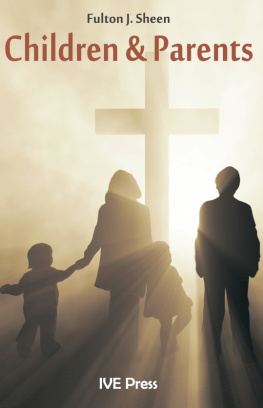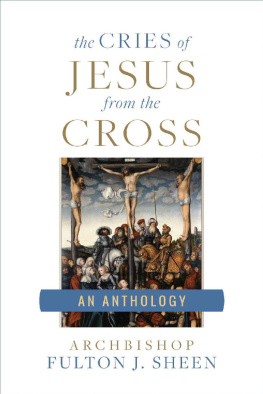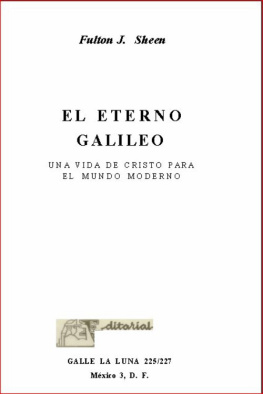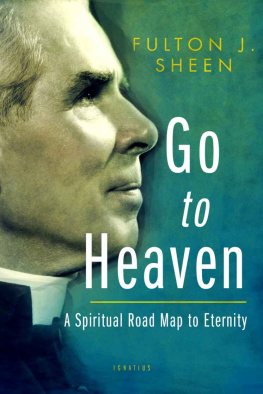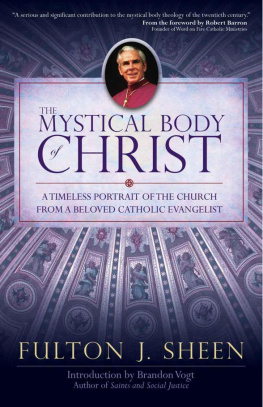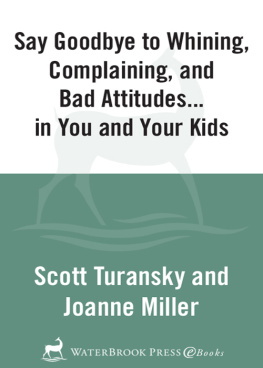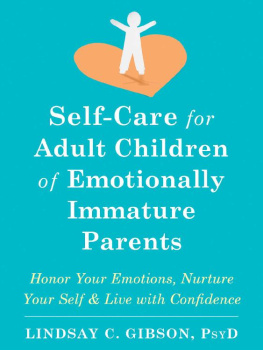
Cover Design
IVE Press
Cover Art
IVE Press
Text
National Society for the Propagation of the Faith.
Revised and Updated by the Religious Family
of the Incarnate Word.
All rights reserved.
Manufactured in the United States of America
113 East 117th Street
New York, NY 10035
Ph. (212) 534 5257
Fax (212) 534 5258
Email
http://www.ivepress.org
ISBN 978-1-933871-82-0
Library of Congress Control Number: 2009924344
Printed in the United States of America
c 1
Children and Parents
Fulton J. Sheen
ebook Edition
Produced by 
1111 Plaza Drive, Suite 300
Schaumburg, IL 60173
Enquiries:
www.ebooks2go.net
ISBN 13: 978-1-933871-82-0
ISBN 10: 1-933871-82-2
Preface
A young teenager who has trouble discovering his identity is very much like a fish stranded on top of the Empire State Building. Lack of identity is emptinessa boredom that comes from being out of an environment which gives meaning to existencewater for a fish, or a home for a child. It used to be that an abnormal person, sometimes labeled the town fool, was protected and loved by the sanity of his neighbors. But when the milieu or the culture itself is more complex, there are no defenses to prevent loss of identity or to act as a therapy when the loss occurs. Unripe wheat pulled from the earth perishes. Youth must have some roots if it is ever to ripen into sanity.
Why does sex occupy so much of the teenagers attention? For one reason, he is not taught the goals and the purposes of life. Lacking a mission in life, he tries to make up for its absence by pursuing the intensity of sensation. A love of speeding is not so much the desire to get there, as a way of killing the boredom of the moment. Sex concentrates on the experience, not on the purpose. Some psychiatrists give another explanation. In Victorian days, sex was repressed. Now death is repressed. Death must never be talked about to children. As Dr. Rollo May put it, Sex is the easiest way to prove our vitality, to demonstrate we are still young, attractive and virile; to prove we are not dead yet.
Americans have the longest adolescence in the world. Children in other countries mature much faster and get down to the serious business of living much earlier. The greater the pressureseither physical, such as the search for bread, or moral, such as the necessity to measure up to a standardthe more they will develop responsible freedom. Teenage in the United States is more cultural than biological. This is due not so much to a generation gap as to an economic condition. Being economically dependent, teenagers do not experience the hard reality of life known to parents. Even affluent men of thirty-five and fifty try to prove their juvenility by imitating the hair styles, dress and customs of the young. It is not physiology as much as the lack of responsibility which prolongs adolescence. We have all seen how quickly youths mature when they are forced to work hard either to become educated or to survive while being educated.
A key to the potential development of a teenager is to see how much he values himself. Does his sense of worth come from within, or without? Does he constantly demand approval? Does disapproval drive him into a tailspin? If so, he identifies being somebody with appearance. Extreme conformism is a sign of weakness. This imitation of others can be very serious because no one can really love others unless he loves himself and has a sense of his own personal worth. Hence the Divine Law: Love your neighbor as you love yourself. Self-esteem begets esteem for neighbor.
One of the most serious threats to the relationship between parent and child is permissiveness. Some parents believe that if they do not give their children everything they want, the children will not love them. This may be true for any given moment, but it is not true for life. Eventually children come to despise parents who lacked character and who allowed them to grow up thinking that the world owes them a living. Having every whim satisfied while young, they could never imagine a world which would not bow down to their tantrums. Later on in life this develops into neurosis because they were never taught limitations. When these children played games, they had limitations: foul lines, umpires, referees, backfield in motion, traveling with the ball, error and managers. When they got home, there were no foul lines. They could manipulate their parents to suit their fancies and feelings. Why cant reality be that way? They asked. But it is not. Consequently, a contradiction arose between the home and the world, between the way one grows up in a family and the adult world surrounding the family.
To escape the neurosis caused by a failure to accept limitations, children sometimes become violent and aggressive in a vain attempt to make society give them what they want. It is sometimes called the search for freedom, but it is a freedom which means the right to do whatever I please. The secret of happy relations between parent and child is the recognition of limitations. We can draw triangles only if we give them three sides. The Truth will make you free.
Most Rev. Fulton J. Sheen, D.D., PH.D.
Table of Contents
Love and Freedom
Parents make the greatest mistake of their lives when they equate freedom with love in dealing with their children, or when they say: But if I did not let Johnny do whatever he wanted, I would be wanting in love. Or, Why should I teach him any morals or religion; wait until he is old enough to decide for himself. But, by the same logic, why should parents ever teach their children English? Why not wait until they are twenty-one and then let them decide which language they want to learn? Why impose habits of cleanliness, politeness or honesty? All parents who exempt themselves from exercising intelligent control and discipline over their children are social nuisances long before their children become delinquents.
What a vast Sahara separates the Western world in which freedom is identified with sentimentalism, from the Communist world where freedom is identified with tyranny. In one instance there is liberty without law, and in the other, law without liberty. Only those with character can understand the basic truth that love involves freedom, but not all freedom involves love.
Love wants to be free, but for a purpose. For example, a young man wishes to be free from parental control at a certain age in order to marry. He wants to be free from home in order to establish a home; he wants to break certain parental chains in order to forge nuptial chains which he equates with happiness. Love uses freedom to submit itself to another or for a high purpose and service. The man who loves a woman may say that he wants to be her slave for the rest of his life, but that kind of slavery he tells her will be his veriest liberty. No one ever falls in love without committing himself, or even subjecting himself to a purpose or a vocation. He wants to be free from something in order to be free for something.
To be entirely free in the sense of having no bonds or obligations to others would be condemning oneself to isolation. No child in a school is more lonely than the one who wants his own way in everything, and thereby finds himself shunned by those who would have been his friends. The egotist who identifies freedom with doing whatever he wants, when he wants and however he wants, may claim that he has friends, but analysis would reveal that they are merely contemporaries who are afraid to cross his will. Those in authority are not always loved. Divine Wisdom did not confer authority on Peter until he had made a triple affirmation of love.
Next page
